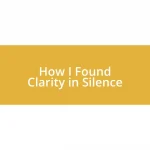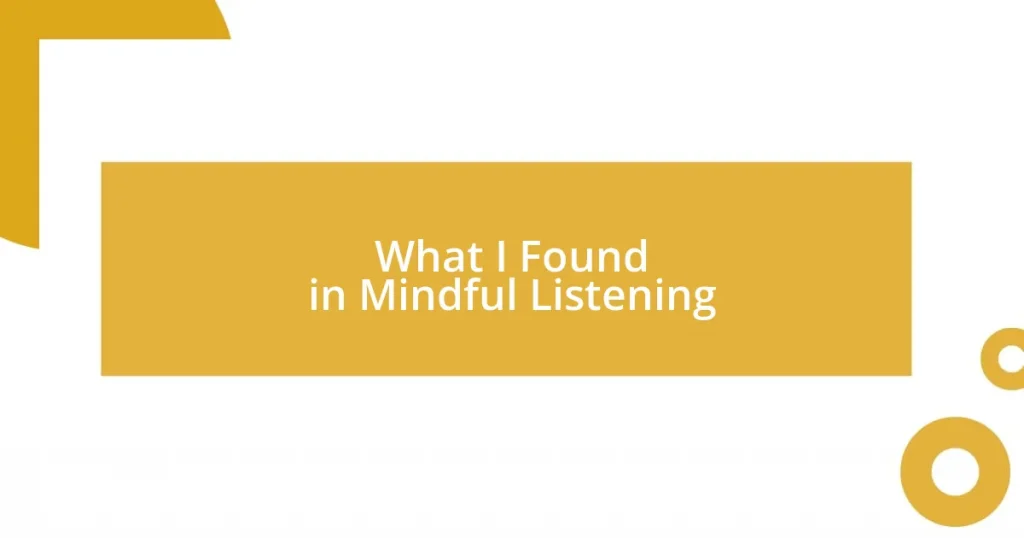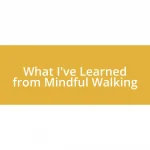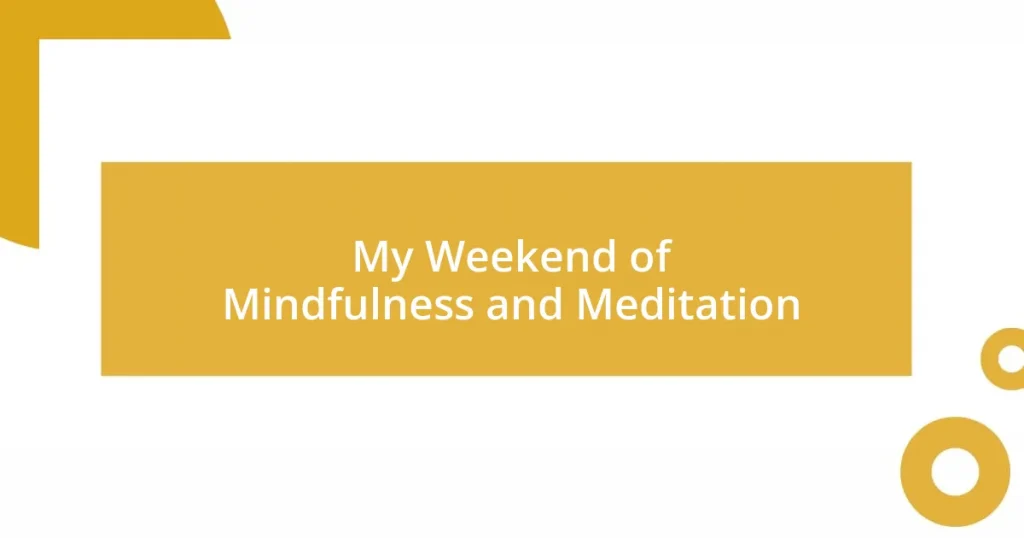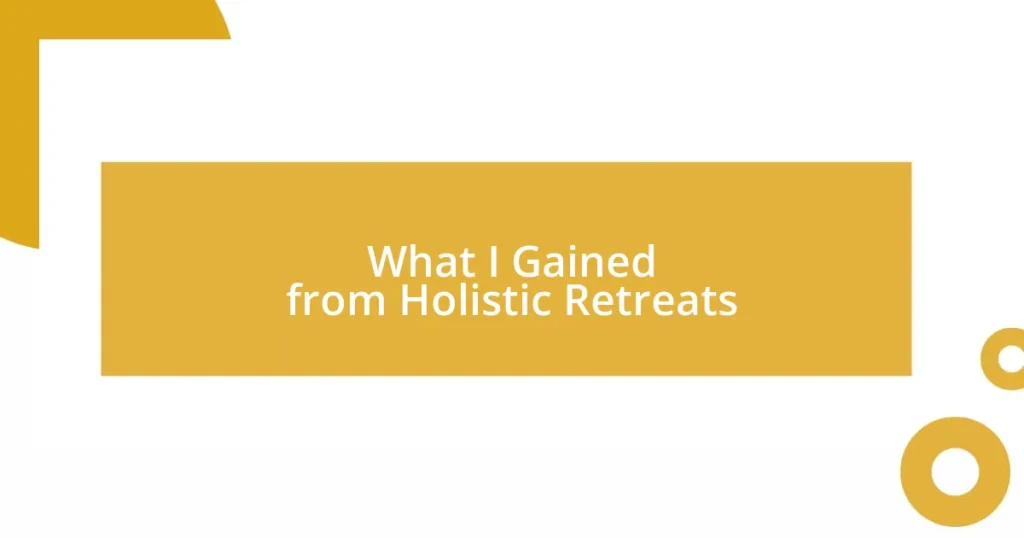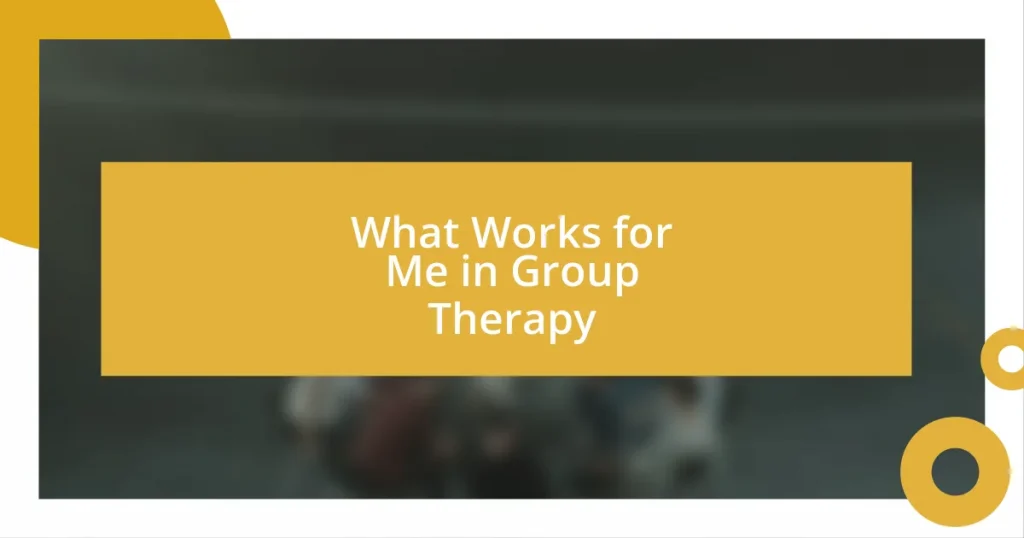Key takeaways:
- Mindful listening involves full presence and engagement, allowing for deeper emotional connections and understanding during conversations.
- Key benefits include improved emotional intelligence, reduction of misunderstandings, and enhanced trust and community.
- Techniques such as reflective listening, eliminating distractions, and practicing empathy significantly enhance listening skills.
- Common challenges include managing distractions, emotional interference, and the tendency to jump to conclusions before the speaker finishes.
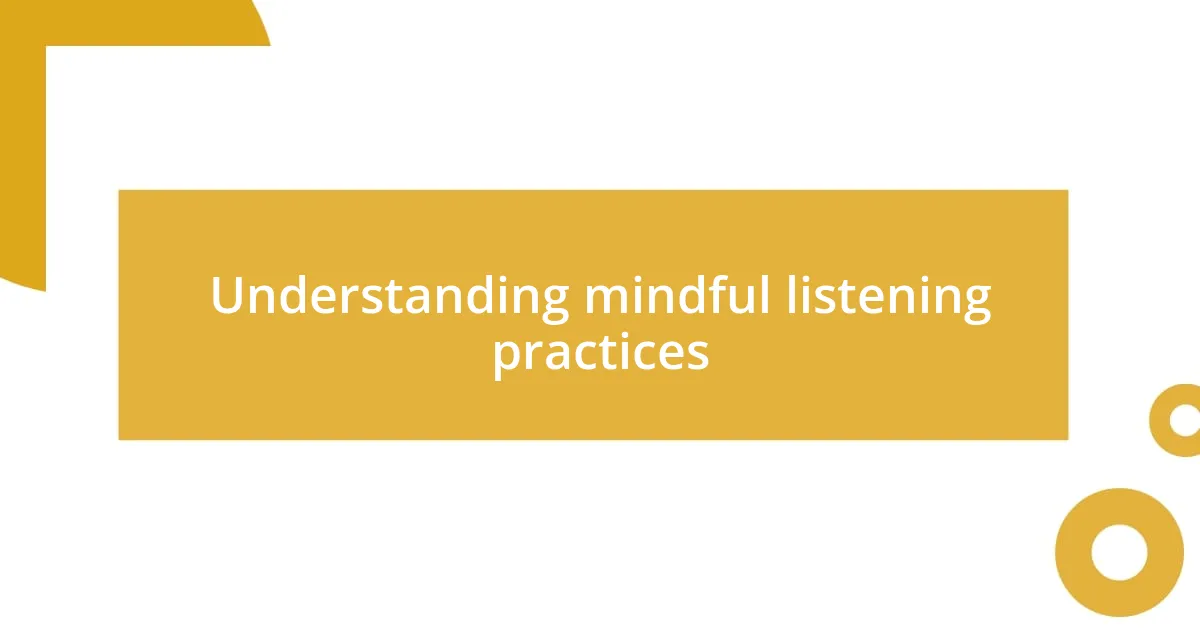
Understanding mindful listening practices
Mindful listening is about fully immersing ourselves in the act of listening, which can transform our interactions with others. I remember one evening chatting with a close friend, and it felt like our words were dancing in the air—every pause, every inflection enriched our understanding. Have you ever experienced that connection where you truly grasp what someone is feeling just by listening intently? It’s magical.
This practice requires us to set aside distractions—like our phones or our racing thoughts—and be present. I often find myself drifting away during conversations, but I’ve noticed that when I focus fully, I not only hear what’s being said but also sense the underlying emotions. The idea that listening is an active rather than passive skill really hit me during a workshop; have you ever thought about how much of our communication is non-verbal?
In essence, understanding mindful listening means recognizing that it goes beyond just hearing words; it’s about engaging with the speaker’s experience. I once took a moment to pause mid-conversation and notice my friend’s body language. It’s amazing how much more depth I got from that single mindful pause. Don’t you think that by truly understanding this, we could improve our relationships in meaningful ways?
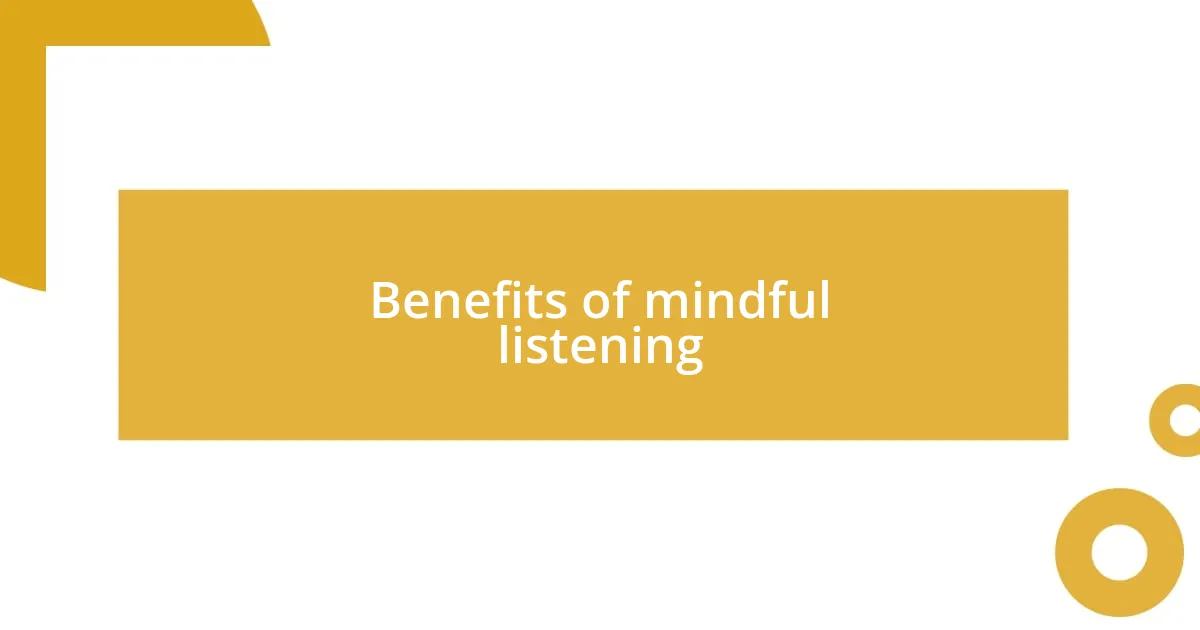
Benefits of mindful listening
It’s fascinating how mindful listening can enhance our emotional intelligence. When I began applying these techniques in my daily interactions, I noticed a profound shift in how I connected with others. One time, during a particularly intense conversation with my partner, I made a conscious effort to really listen—putting myself in their shoes—and it led to deeper understanding and resolution of misunderstandings that had lingered for far too long.
Another significant benefit I’ve encountered is the reduction of misunderstandings. By actively listening, I’ve discovered that it’s often the small details we miss that lead to bigger issues. There was a moment in a team meeting when a colleague shared a concern. Instead of formulating my response while they spoke, I listened fully. This not only clarified their perspective but also helped me respond in a way that resonated with them. Have you tried this approach before? It can change the way you see conflicts.
Lastly, I believe that mindful listening fosters a sense of community and trust. I once participated in a group session focused on listening skills, where we practiced in pairs. Hearing someone’s story without interruption created a bond that was tangible. Each shared experience felt like a thread weaving us closer. This wouldn’t be possible without mindful attention; the warmth and connection are irreplaceable.
| Benefit | Description |
|---|---|
| Improved Emotional Intelligence | Enhances understanding of others’ feelings and emotions. |
| Reduction of Misunderstandings | Clarifies perspectives, leading to more effective communication. |
| Increased Trust and Community | Fosters deeper connections and strengthens relationships. |
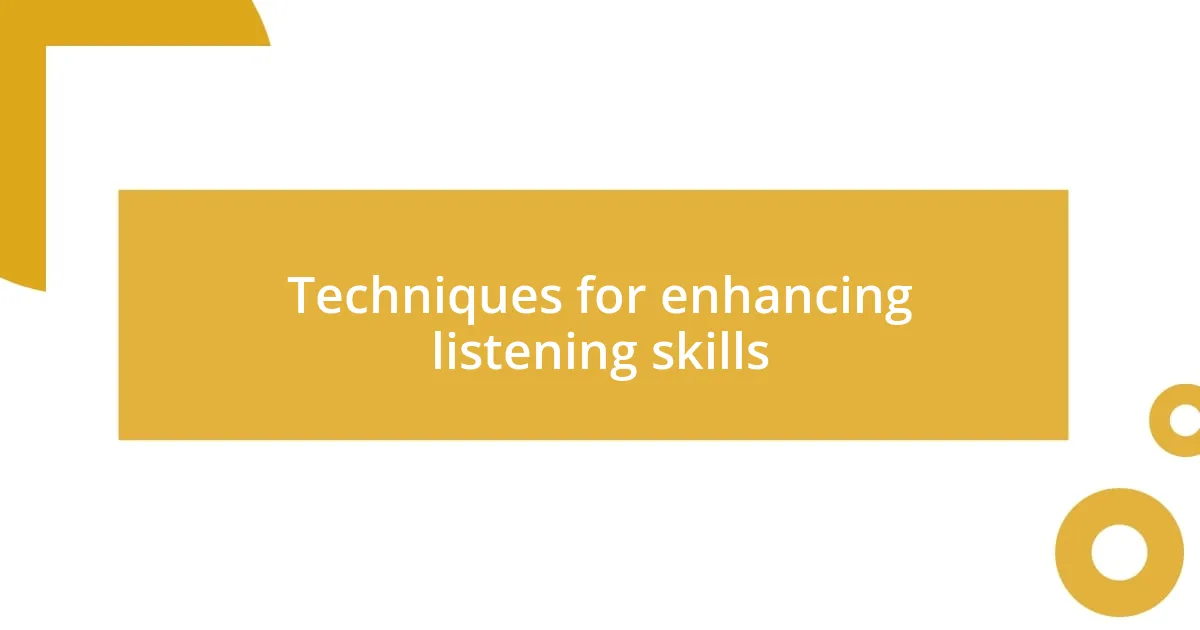
Techniques for enhancing listening skills
One technique I find particularly effective is the practice of reflective listening. This involves summarizing what the speaker has said to confirm understanding. I’ll never forget the time I had a difficult conversation with a colleague. By repeating back their key points, I noticed how they visibly relaxed, feeling truly heard. It’s astonishing how this simple technique can create a safe space for dialogue.
Here are some techniques that can enhance your listening skills:
- Eliminate Distractions: Create an environment free from interruptions to focus completely on the speaker.
- Practice Empathy: Try putting yourself in the speaker’s shoes; this brings depth to your understanding.
- Use Open Body Language: Maintain eye contact and a relaxed posture to show engagement and openness.
- Ask Clarifying Questions: If something isn’t clear, don’t hesitate to ask questions to deepen your understanding.
- Pause Before Responding: Take a breath before you speak to ensure you process what was said fully.
Another powerful technique is mindfulness meditation specifically aimed at enhancing listening. I tried this approach before an important meeting, and it helped me center my thoughts. By taking a moment to establish calmness, I felt more present, allowing my mind to focus on the speaker without wandering. That meeting turned into a collaborative discussion rather than a simple exchange of information, all because I took time to prepare my mind for listening.
For a richer listening experience, consider the following tips:
- Set Intentions: Before a conversation, remind yourself to listen with an open heart and mind.
- Visualize Active Listening: Picture yourself absorbing the words and emotions of the speaker, creating a mental connection.
- Limit Formulating Responses: Stay present without thinking about what you’ll say next; let the words unfold naturally.
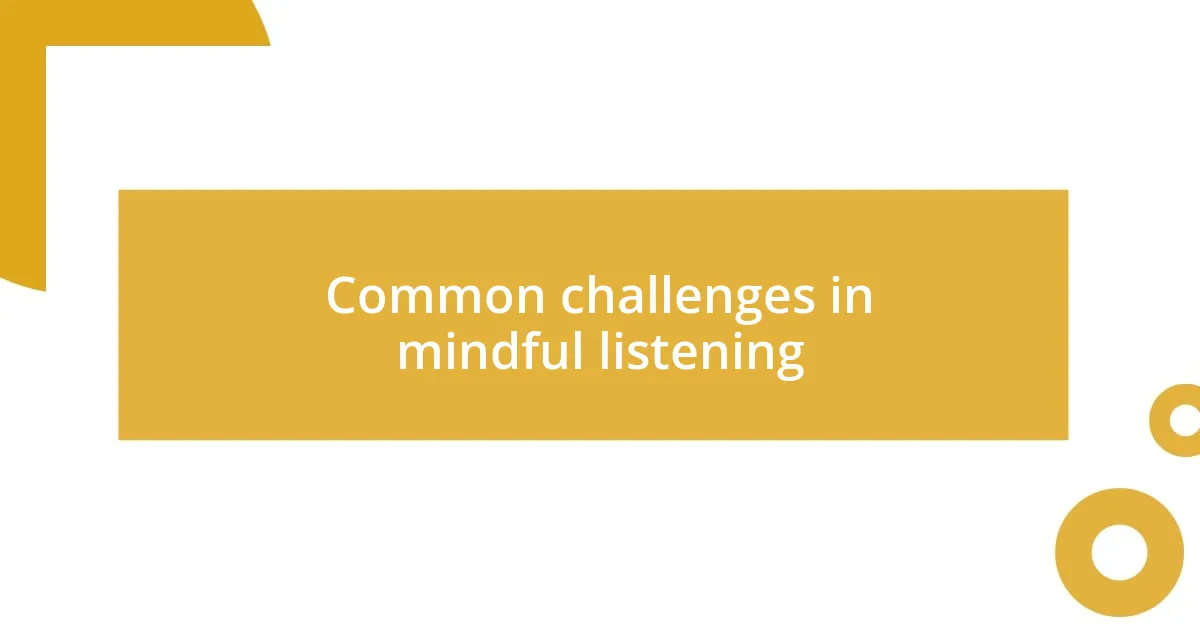
Common challenges in mindful listening
One of the biggest hurdles in mindful listening is managing distractions. I remember a conversation I had at a bustling café, trying to engage with a friend while music played and conversations buzzed around us. Despite my intention to listen, I found my focus drifting. It made me think: how can we truly connect if our attention is split? Eliminating distractions can be a game-changer, but it requires effort to create the right environment.
Another challenge arises when our emotions get in the way. I was in a discussion about a sensitive topic and, despite my best efforts, I couldn’t help but let my own feelings cloud my understanding of my partner’s perspective. It’s a reminder that mindful listening isn’t simply about hearing words; it’s also about recognizing our emotional responses. How often do we let our emotions dictate the conversation instead of focusing on the speaker’s message? Acknowledging our feelings can help us listen more openly.
Lastly, the tendency to jump to conclusions before the speaker finishes is something I struggle with. I recall a team brainstorming session where I prematurely assumed the direction of a colleague’s idea, preparing my feedback too soon. This not only stifled their voice but also limited my understanding of their full concept. I’ve learned that patience in listening allows for deeper insights and richer exchanges. Have you ever found yourself doing the same? It’s important to embrace silence and let the speaker complete their thoughts.
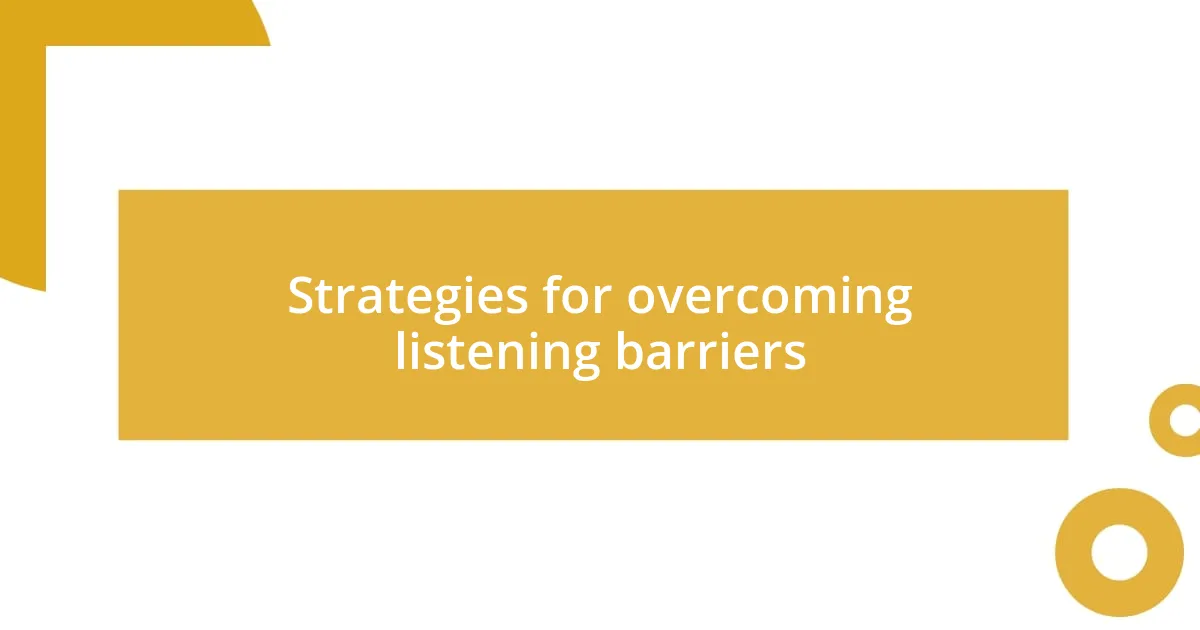
Strategies for overcoming listening barriers
Overcoming listening barriers involves actively recognizing and addressing distractions in our environment. I recall a moment at a family gathering where my phone buzzed repeatedly. Each notification pulled my attention away, and I realized how little I actually absorbed from the conversations around me. By turning off my phone and focusing solely on those present, I not only deepened my connections but also made my family feel valued. Isn’t it interesting how a simple shift can transform our interactions?
Emotions can act as a double-edged sword when it comes to listening. During a heated discussion about a joint project, I could feel my frustration rising with each point my colleague made. Instead of truly listening, I found myself brewing counterarguments in my mind. In that moment, I paused, took a breath, and shifted my focus back to their viewpoint. This was pivotal, as it allowed me to grasp their perspective fully, and I discovered solutions I had overlooked. Have you ever had a similar experience where stepping back led to clarity?
Practicing empathy is another essential strategy for enhancing our listening. I vividly remember a time when a friend opened up about their struggles at work. Instead of offering advice immediately, I leaned in and tried to genuinely feel what they were going through. The result was not only a stronger bond but also a deep insight into their challenges. How often do we rush to solve problems instead of understanding them first? Listening empathetically transforms conversations into meaningful dialogues, paving the way for true connection.









